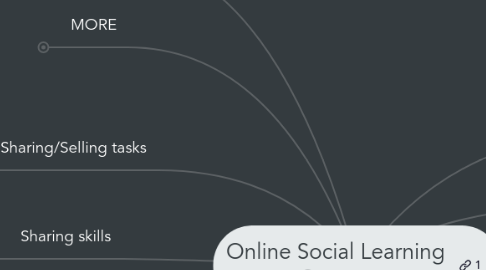
1. MORE
1.1. CloudWorks
1.2. Educational Urbanism (Ian Banerjee)
1.3. FutureLab
1.4. Hack Education (Audrey Watters)
1.5. Vision Mapper
1.6. About
1.6.1. The workforce in the cloud
2. Q&A
2.1. Concerns
2.1.1. Pricing ourselves out of the market
2.1.2. You can't just keep making class size better
2.1.3. Students don't want to sit in class
2.1.4. Will kids know how to be independent learners?
2.1.5. How to scale?
2.1.6. Haves vs havenots
2.1.7. PEDAGOGY
2.1.8. Assessment
2.1.8.1. Students sharing "answers
2.1.8.2. Are the teachers asking the right questions?
2.1.9. Analytics / "impact"
2.2. Themes
2.2.1. Personalization
2.2.2. Social
2.2.3. FREE
2.2.3.1. Value
2.2.3.2. Certification
2.2.4. Localization
2.2.5. Asynchronous
2.2.6. Qualifiable
2.2.7. Transferrable
2.2.8. Open
2.3. Solutions
2.3.1. Community learning
2.3.2. Assessment / validation
2.3.2.1. badges
2.3.3. Service learning
2.3.4. Mentorship
2.3.5. How can we use these?
2.3.5.1. Traditional educational projects could explore these new spaces
2.3.5.2. Connect traditional ed to new social spaces
2.3.5.3. Students become teachers
2.3.5.4. Students become EXPERT teachers
2.3.5.5. National Science Museum example
2.4. Scenario
2.4.1. Recruiter from industry
2.4.1.1. Resumes
2.4.1.2. How do I vet skills of DIY U spaces?
2.4.1.3. Train me how to evaluate these students?
2.4.1.4. Will nontraditional student be in my keep file?
2.4.2. Alternative certification processes
2.4.2.1. Mozilla Open Badges
2.4.2.2. "If you don't have a blog, you don't have a resume"
2.5. Question
2.5.1. "Who offers a learning experience that is value added, different than the lecture hall?
2.5.2. Maybe the future of higher ed is to do what it does well even better"
2.5.3. Higher ed isn't formatted well for the "Bulge Learner"
2.5.4. How does this connect to Common Core in K12?
2.5.5. What aout fostering independent learning from an early age?
2.6. Takeaways
2.6.1. Administration vs Self-design
2.6.2. Face to face vs online community building
2.6.3. Less about the content
2.6.3.1. Define competencies
2.6.3.2. Assess / measure competencies
2.6.3.3. Demonstrate competencies
2.6.4. Digital divide
2.6.5. Goals
2.6.6. Economics
2.7. More tools & Spaces
2.7.1. Cramster
2.7.2. Einztein
2.7.3. Mozilla Open Badges
2.7.4. Open Study
2.7.4.1. About
2.7.5. Piazza
2.7.6. School of Everything
2.7.7. About
2.7.7.1. Taking it to the streets
2.7.7.2. Cathy Davidson
3. Sharing/Selling tasks
3.1. 65 Hours
3.2. I Can Help
3.2.1. About
3.3. TaskRabbit
3.4. Zaarly
4. Sharing skills
4.1. Bristol Skillswap
4.2. Brooklyn Skillshare
4.3. Local Skill Swap
4.4. Progressive Library Skillshare
4.5. Skillbound
4.6. Skillshare
4.6.1. About
4.6.1.1. 11-08: Skillshare Raises $3.1 Million to Turn Everyone Into Teachers
4.6.1.2. 11-05: Organize An Offline Class With Skillshare
4.6.1.3. 12-01: Teach What You Know: How to Make a Living on Skillshare
4.6.1.4. 12-03: Skillshare Launches ‘Schools’ for Brands
4.6.1.5. 12-04: How Skillshare Is Transforming Education as We Know It
4.6.2. Skillshare: Learn
4.6.3. Skillshare: Teach
4.6.4. Penny Conference
4.7. Skillshare International
4.8. Skillshare-York
4.9. Skill Swap Brighton
4.10. Skill Swap Shop
4.11. Swap A Skill
4.12. Other examples
4.12.1. Brighton Digital Festival
4.12.2. Skillswap goes Javascript
4.12.3. Skillswap goes turbocharging the web
4.12.3.1. Descriptions
4.12.4. Skillswap goes wayfinding
5. Selling learning
5.1. Betterfly
5.2. The Commons Brooklyn
5.3. Udemy
5.4. WizIQ
5.5. Health
5.5.1. LearnItLive
5.5.2. MCCSM
6. Sharing learning
6.1. Brooklyn Brainery
6.2. Freeconomy Community
6.3. Udacity
7. INTRO
7.1. CoolToys
7.2. Bubble
7.3. Earlier mindmap
8. Games/VW
8.1. CodeAcademy
8.2. Open University in Second Life
8.2.1. Flickr
8.2.2. Movie
9. Do it Myself
9.1. DIY U
9.2. Do It Yourself Scholar
9.3. SOLE (Self-Organized Learning Environment)
9.3.1. About SOLE
9.3.2. Sugata Mitra
9.4. Uncollege
10. Open Education
10.1. OER Commons
10.2. Carnegie Mellon University - Open - Free Courses
10.3. Open Michigan
10.4. Open MIT
10.5. Open University
10.5.1. iTunes
10.6. Open Yale
10.7. Background: Creative Commons
11. "Adopt Adapt Improve"
11.1. Higher Ed Responds
11.1.1. Coursera
11.1.2. MITx
11.1.3. EdX
11.2. MOOCs
11.2.1. Examples
11.2.1.1. Stanford Artificial Intelligence
11.2.1.2. Change MOOC
11.2.1.3. eduMOOC
11.2.2. Types
11.2.2.1. cMOOC
11.2.2.2. xMOOC
11.2.2.3. DOCC
11.2.2.3.1. Distributed Online Collaborative Course
11.2.3. Best Practices
11.2.3.1. Wiki
11.2.3.2. Collaborative book about MOOCs
11.2.4. Finding Tools
11.2.4.1. History of & List
11.2.5. Issues
11.2.5.1. NYTimes
11.2.5.2. Economics
11.2.5.3. Does learning occur?
11.2.5.4. Based on "same old"
